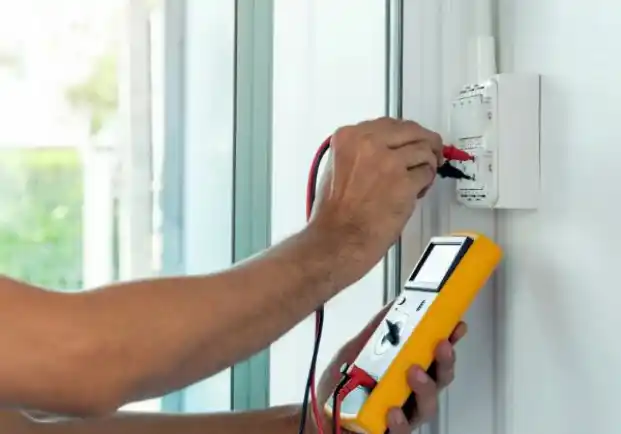Learn about methods of protection from electrical hazards with Al-Safi

Electricity is an essential element in our lives, but it can become a major hazard if misused, ranging from fires to electric shocks. Electrical failures or negligence can cause serious damage that threatens both lives and property. Therefore, taking the necessary preventive measures and following safety procedures is crucial to ensure a safe environment for everyone.
In this article, we will explain the most important ways to prevent electrical hazards, so that you can avoid deadly risks that may arise, and to spread greater awareness among individuals about electrical dangers.
Electrical hazards at home: Safe ways to use electricity
Electricity must always be handled with caution to avoid serious damage to both people and property. Below, Al-Safi Company highlights some household electrical hazards and provides tips and measures to prevent them:
-
Keeping water and electricity apart:
Water and moisture are among the main causes of electrical issues. Therefore, water and electricity should always be kept apart at home.
For instance, if an electrical appliance connected to power falls into water, do not pick it up directly. First, cut off the power from the main panel, then remove and dry the device completely before reuse.
-
Do not leave unused appliances plugged in:
Turning off electrical devices after use is not enough; they should be unplugged completely to avoid potential hazards from overheating. Devices consume energy even when turned off. For safer electricity use, it is advised to use modern smart plugs that allow remote control of appliances.
-
Conduct regular inspections of home electricity:
Switches and wires should be checked regularly to remove damaged ones, especially old ones. Signs such as excessive heating, burning smells, or sparks may indicate danger. An electrician can verify the safety of the entire system, from wiring to grounding appliances.
What are the methods of preventing electrical hazards?
Here are the main methods of preventing electrical hazards:
- Use high-quality electrical connections that meet approved standards, and avoid counterfeit or poor-quality devices.
- Avoid overloading circuits by distributing electrical loads across several circuits to prevent overheating and short circuits.
- Perform regular maintenance and inspection of equipment and wiring to ensure efficiency.
- Install automatic circuit breakers that cut off power during current surges or short circuits.
- Keep appliances away from moisture, bathrooms, and sinks. Do not touch or operate devices with wet hands.
- Use child-safety sockets to protect children from inserting objects into outlets.
- Educate workers about electrical hazards, how to use safety tools, personal protective equipment, and emergency response procedures.
The importance of awareness in reducing the impact of electrical hazards on property
Raising awareness about electrical risks in different work environments is vital for safety. It reduces financial losses and protects buildings and facilities from damage caused by electrical accidents.
The goal of awareness is to spread knowledge about electrical dangers, change behaviors towards safe practices, promote a culture of electrical safety in society, and enable individuals to make the right decisions regarding safety.
Here are the main benefits of awareness about electrical hazards:
- Identifying causes of electrical fires, such as overloads or damaged wires.
- Preserving appliances through proper use and regular maintenance, reducing breakdowns and repair costs.
- Reducing accidents due to awareness, thus protecting property from serious risks.
- Ensuring electrical safety by reducing electric shocks and keeping people safe.
- Protecting property from damage caused by faulty equipment and wiring.
- Ensuring compliance with laws and regulations related to electrical safety by educating individuals.
Why is Al-Safi the best choice to protect you from electrical hazards?
When it comes to safety, there is no room for negligence. This is where Al-Safi Safety Company comes in. It is a leading company providing integrated solutions against electrical hazards, offering a wide range of protective products, along with periodic maintenance services to ensure people’s safety.
Al-Safi also provides high-quality fire extinguishers at competitive prices to protect you from unexpected accidents, with a wide variety suitable for homes, businesses, factories, and more.
If you are looking for safety and protection, do not hesitate to contact us now.
In conclusion, we have explained the methods of preventing electrical hazards. These risks should never be underestimated, as they can harm both lives and property and may even cause death. Awareness and preventive measures are essential to avoid them.
Frequently asked questions about preventing electrical hazards
What are the ways to prevent electrical hazards?
Make sure electrical wires are not cracked or covered with carpets and rugs. Keep appliances away from hot surfaces and wet areas. Avoid overloading circuits, as they are designed for specific energy capacities. Do not unplug cords forcefully.
What are electrical safety tools?
Insulating gloves are among the most important tools for protecting individuals when dealing with electricity. These gloves are usually made of insulating rubber that prevents electric current from passing through the body. They must comply with safety requirements for the intended tasks.
What are the electrical safety rules at work?
Workplace safety rules include ensuring a sufficient number of sockets, avoiding connecting too many devices to one outlet to prevent fires, turning off and unplugging equipment before repairing or cleaning, and providing the necessary cables and equipment near workstations.
What type of extinguisher is used for electrical fires?
It is recommended to use powder extinguishers or carbon dioxide extinguishers to put out electrical fires, in order to avoid the risk of electric shock.



